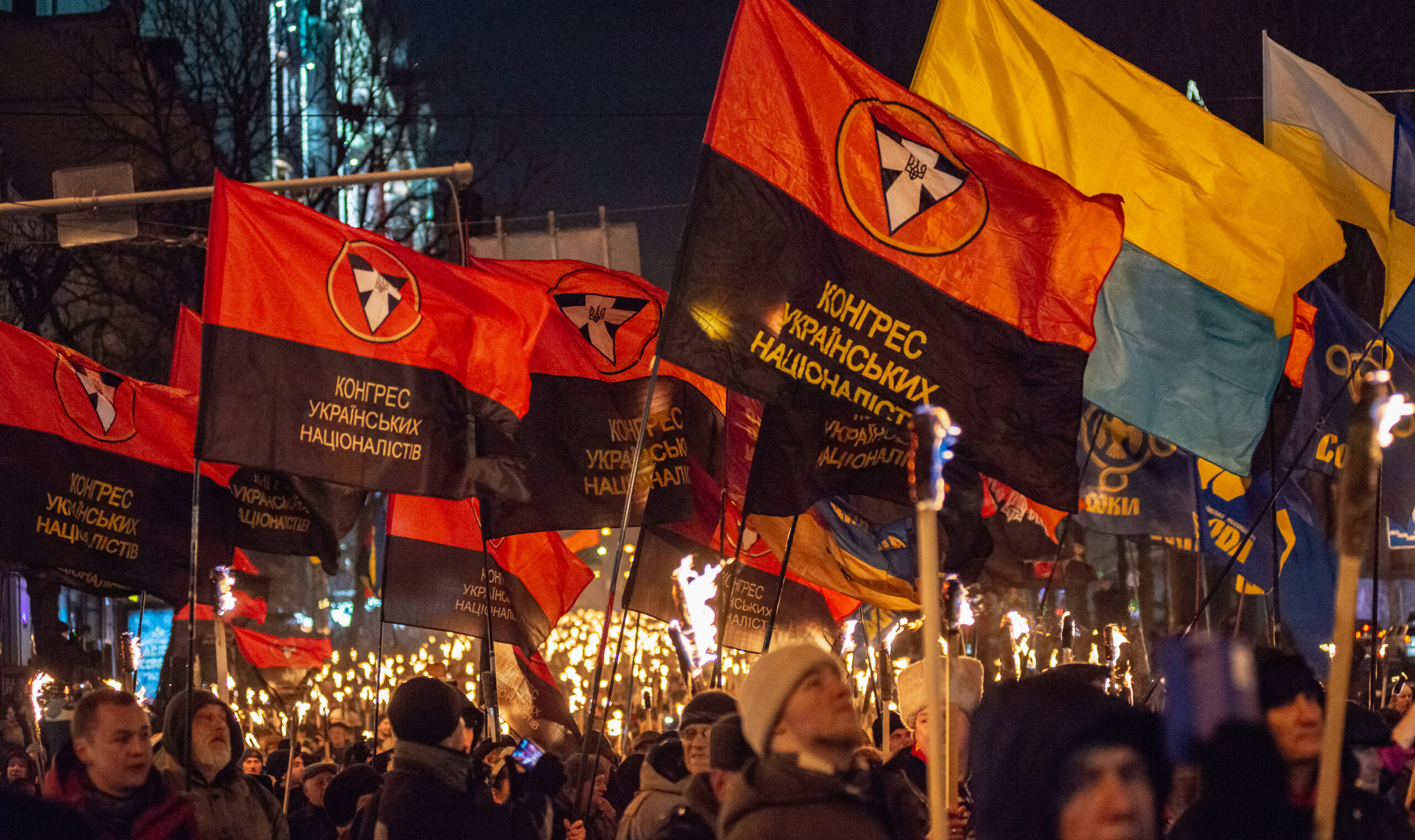


Loading the Elevenlabs Text to Speech AudioNative Player...
There has been no shortage of provocative flags being displayed at the National Stadium in Warsaw. The building, after all, has played host to all kinds of domestic and international football rivalries.
A flag displayed at a concert of the Belarusian rapper Max Korzh, though, has provoked a different kind of controversy. One member of the crowd held up the red-and-black flag of the Ukrainian Insurgent Army (UPA).
This would have been a bad idea anywhere—but it was especially bad in the heart of the Polish capital.
The UPA was formed in the early 1940s to fight against the Nazis and the Soviets. At the same time, though, it persecuted Poles living on the Polish–Ukrainian border. In his magisterial book God’s Playground: A History of Poland, Norman Davies writes about how the Ukrainian nationalists “seized the opportunity…to eliminate the Poles”:
Armed gangs toured the towns and the villages, usually at night, burning Polish homesteads, slaughtering Polish men, women, and children without mercy, murdering Catholic priests, forcing the remnants to flee, and terrorising all non-compliant Ukrainians.
Davies’s estimate that the victims “must be numbered in the hundreds of thousands” is controversial, but tens of thousands of victims have been individually documented. Even the founder of the UPA was appalled by the massacres. In his paper “The Organization of Ukrainian Nationalists and the Ukrainian Insurgent Army: Unwelcome Elements of an Identity Project,” the historian John-Paul Himka quotes the Ukrainian nationalist leader Taras Bulba-Borovets as saying,
The “hatchet men,” to their shame, butcher and hang defenceless women and children ... We must take into account that England will surely win this war, and it will treat these “hatchet men” and lynchers and incendiaries as agents in the service of Hitlerite cannibalism, not as honest fighters for their freedom, not as state-builders.
Bulba-Borovets’s wife was murdered by more hardline Ukrainian nationalists. These militants, the Organization of Ukrainian Nationalists (OUN), were led by a man named Stepan Bandera. In the 1930s, amid disputes over Polish and Ukrainian territory, Bandera had been jailed for his part in the assassination of the Polish Minister of Interior Bronisław Pieracki. “Millions of victims [had] to be sacrificed” for the sake of the Ukrainian cause, claimed Bandera.
During the war, Bandera worked with the Nazis to pursue his goals, with the OUN proclaiming that Hitler was “forming a new order in Europe” before dedicating itself to pursuing “a sovereign and united State and a new order in the whole world.” While his involvement in atrocities was limited by the fact that the cautious Nazis had detained him, they were very much enacted in the spirit of his “national revolution.” He never condemned them.
Still, many Ukrainians celebrate Bandera and his men. Marches honour them. Soldiers brandish their flag. This is a cause of understandable outrage in Poland. Polish politicians have protested when Bandera has been commemorated in the Ukrainian Parliament—and when, perhaps even more insultingly, the UPA’s flag has decorated vehicles supplied by the Poles.
Such controversies have also erupted within Poland, even before Max Korzh’s concert. In 2022, Polish police officers removed a UPA flag from a Wrocław balcony. It had allegedly been hung there by a Ukrainian migrant. Last month, a memorial to the victims of the UPA’s massacres, which had been erected in the Polish village of Domostawa, was vandalized with a painting of the UPA’s flag, though the perpetrators have yet to be caught.
Exacerbating Polish resentment has been the peculiar intransigence of the Ukrainian authorities when it has come to permitting the exhumation of Polish graves in Ukraine. Granted, the Ukrainians allowing Polish archaeologists to begin exhuming graves near Lviv this spring was a welcome step forwards.
It would be childish not to understand why Ukrainians might find it difficult to accept criticism of men who fought and died for their country. It would also be small-minded not to understand why Ukrainians might find it hard to think about people who died in the Second World War while their compatriots are being killed today. Finally, it is opportunistic in the extreme for Vladimir Putin to use the specter of “Banderites” to excuse his invasion when he engages in his own Second World War revisionism—as well, of course, as when his soldiers are carrying out war crimes.
That there is some extent to which we can understand many Ukrainians’ mistake in glorifying the UPA, though, by no means prevents it from being a mistake. Most importantly, it is a moral mistake—obscuring vast and systematic injustice in the name of their own cause. Additionally, it is a practical mistake. Poland led the way in supporting the Ukrainians—militarily and in humanitarian terms. To celebrate the killers of their forebears is a good way to exacerbate the recent decline in support.
It would be an appalling shame for the self-indulgence of a minority of the most stubborn or blinkered Ukrainian nationalists to sever links between peoples who have both faced such horrendous oppression. Certainly, it must be hard for the Ukrainians to address their past while coping with such dangers in the present. But this is no excuse for waving the symbols of murderers in the faces of their victims’ descendants.
